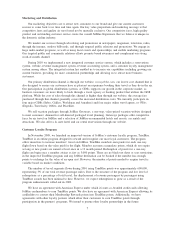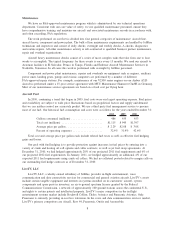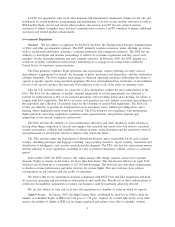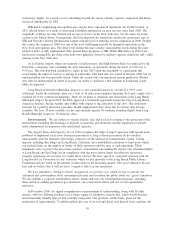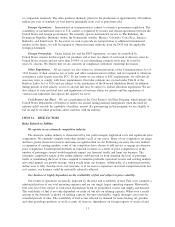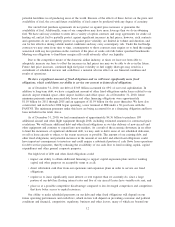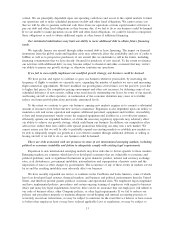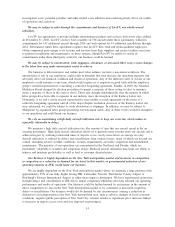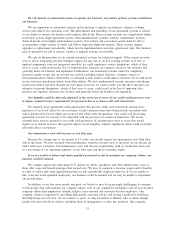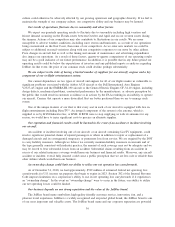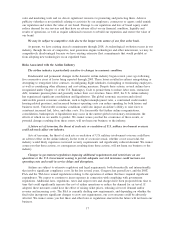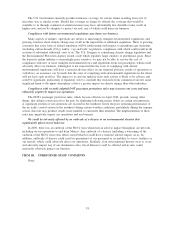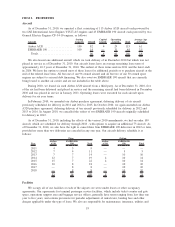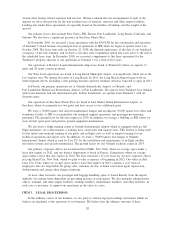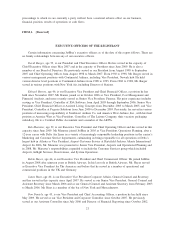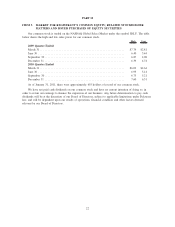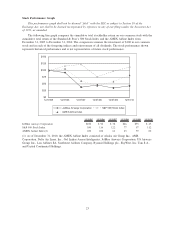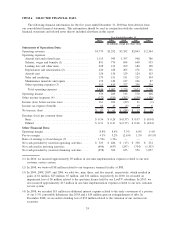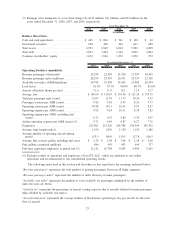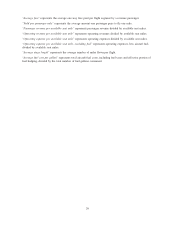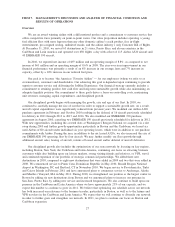JetBlue Airlines 2010 Annual Report Download - page 26
Download and view the complete annual report
Please find page 26 of the 2010 JetBlue Airlines annual report below. You can navigate through the pages in the report by either clicking on the pages listed below, or by using the keyword search tool below to find specific information within the annual report.sales and marketing tools and we devote significant resources to promoting and protecting them. Adverse
publicity (whether or not justified) relating to activities by our employees, contractors or agents could tarnish
our reputation and reduce the value of our brand. Damage to our reputation and loss of brand equity could
reduce demand for our services and thus have an adverse effect on our financial condition, liquidity and
results of operations, as well as require additional resources to rebuild our reputation and restore the value of
our brand.
We may be subject to competitive risks due to the longer term nature of our fleet order book.
At present, we have existing aircraft commitments through 2018. As technological evolution occurs in our
industry, through the use of composites, next generation engine technologies and other innovations, we may be
competitively disadvantaged because we have existing extensive fleet commitments that would prohibit us
from adopting new technologies on an expedited basis.
Risks Associated with the Airline Industry
The airline industry is particularly sensitive to changes in economic condition.
Fundamental and permanent changes in the domestic airline industry began several years ago following
five consecutive years of losses being reported through 2005. These losses resulted in airlines renegotiating or
attempting to renegotiate labor contracts, reconfiguring flight schedules, furloughing or terminating employees,
as well as considering other efficiency and cost-cutting measures. Despite these actions, several airlines have
reorganized under Chapter 11 of the U.S. Bankruptcy Code to permit them to reduce labor rates, restructure
debt, terminate pension plans and generally reduce their cost structure. Since 2005, the U.S. airline industry
has experienced significant consolidation and liquidations. The global economic recession and related
unfavorable general economic conditions, such as higher unemployment rates, a constrained credit market,
housing-related pressures, and increased business operating costs can reduce spending for both leisure and
business travel. Unfavorable economic conditions could also impact an airline’s ability to raise fares to
counteract increased fuel, labor, and other costs. It is foreseeable that further airline reorganizations,
consolidation, bankruptcies or liquidations may occur in the current global recessionary environment, the
effects of which we are unable to predict. We cannot assure you that the occurrence of these events, or
potential changes resulting from these events, will not harm our business or the industry.
A future act of terrorism, the threat of such acts or escalation of U.S. military involvement overseas
could adversely affect our industry.
Acts of terrorism, the threat of such acts or escalation of U.S. military involvement overseas could have
an adverse effect on the airline industry. In the event of a terrorist attack, whether or not successful, the
industry would likely experience increased security requirements and significantly reduced demand. We cannot
assure you that these actions, or consequences resulting from these actions, will not harm our business or the
industry.
Changes in government regulations imposing additional requirements and restrictions on our
operations or the U.S. Government ceasing to provide adequate war risk insurance could increase our
operating costs and result in service delays and disruptions.
Airlines are subject to extensive regulatory and legal requirements, both domestically and internationally,
that involve significant compliance costs. In the last several years, Congress has passed laws, and the DOT,
FAA and the TSA have issued regulations relating to the operation of airlines that have required significant
expenditures. We expect to continue to incur expenses in connection with complying with government
regulations. Additional laws, regulations, taxes and airport rates and charges have been proposed from time to
time that could significantly increase the cost of airline operations or reduce the demand for air travel. If
adopted, these measures could have the effect of raising ticket prices, reducing air travel demand and/or
revenue and increasing costs. The FAA is currently drafting new requirements, and depending on whether the
final rules incorporate significant changes to crew rest requirements, our cost structure could be adversely
affected. We cannot assure you that these and other laws or regulations enacted in the future will not harm our
business.
17


